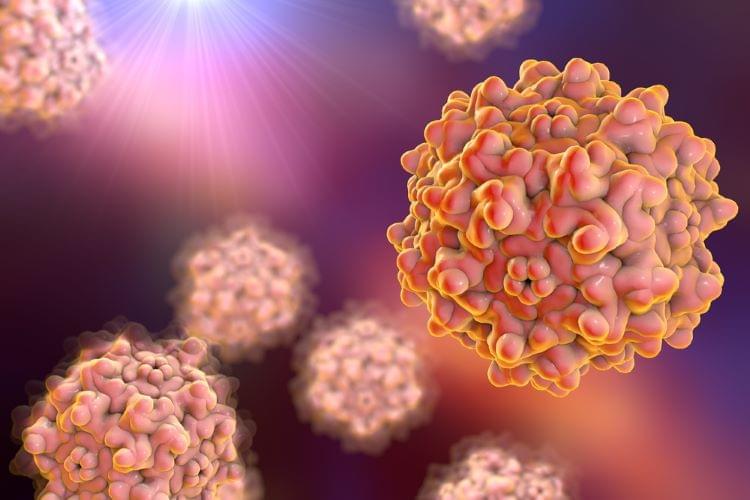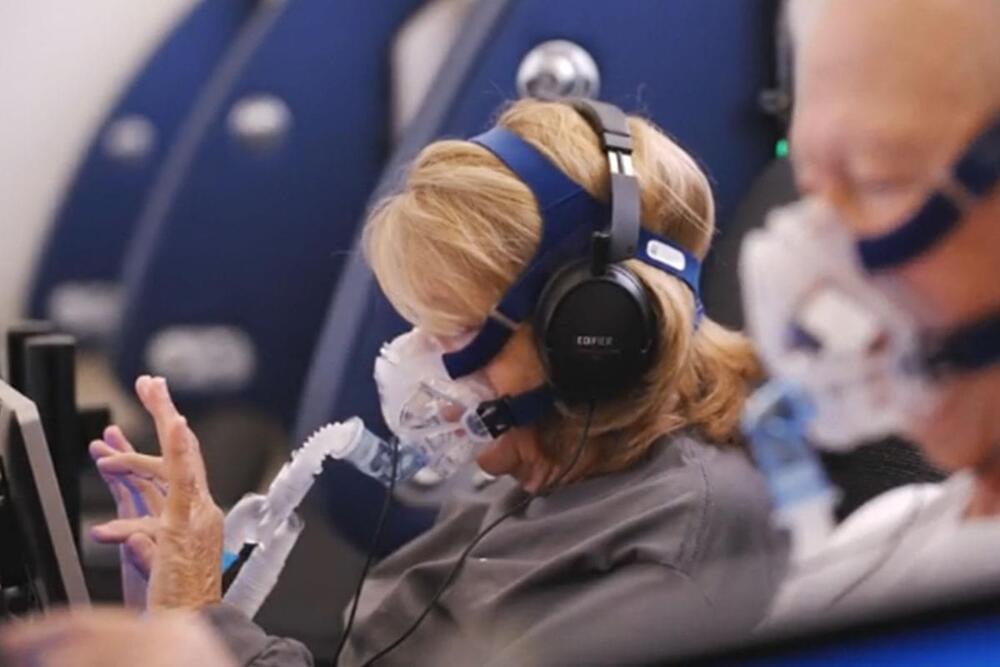Weathered or unhealthy skin is emerging as a major risk factor for almost every single age-related disease, from Parkinson’s to type 2 diabetes.


Andreessen Horowitz General Partner Vijay Pande, who oversees the firm’s health and bio fund, joins Bloomberg’s Ed Ludlow to discuss his AI strategy, and how generative AI can help safely engineer medicines at scale, support doctors and patients, and drive greater efficiency and better outcomes.
——-
Like this video? Subscribe to Bloomberg Technology on YouTube:
https://www.youtube.com/channel/UCrM7B7SL_g1edFOnmj-SDKg.
Watch the latest full episodes of “Bloomberg Technology” with Caroline Hyde and Ed Ludlow here: https://tinyurl.com/ycyevxda.
Get the latest in tech from Silicon Valley and around the world here:
https://www.bloomberg.com/technology.
Connect with us on… Twitter: https://twitter.com/technology Facebook: https://www.facebook.com/BloombergTec… https://www.instagram.com/bloombergbu…
Twitter: https://twitter.com/technology.
Facebook: https://www.facebook.com/BloombergTechnology.
Instagram: https://www.instagram.com/bloombergbusiness/

Will we ever decipher the language of molecular biology? Here, I argue that we are just a few years away from having accurate in silico models of the primary biomolecular information highway — from DNA to gene expression to proteins — that rival experimental accuracy and can be used in medicine and pharmaceutical discovery.
Since I started my PhD in 1996, the computational biology community had embraced the mantra, “biology is becoming a computational science.” Our ultimate ambition has been to predict the activity of biomolecules within cells, and cells within our bodies, with precision and reproducibility akin to engineering disciplines. We have aimed to create computational models of biological systems, enabling accurate biomolecular experimentation in silico. The recent strides made in deep learning and particularly large language models (LLMs), in conjunction with affordable and large-scale data generation, are propelling this aspiration closer to reality.
LLMs, already proven masters at modeling human language, have demonstrated extraordinary feats like passing the bar exam, writing code, crafting poetry in diverse styles, and arguably rendering the Turing test obsolete. However, their potential for modeling biomolecular systems may even surpass their proficiency in modeling human language. Human language mirrors human thought providing us with an inherent advantage, while molecular biology is intricate, messy, and counterintuitive. Biomolecular systems, despite their messy constitution, are robust and reproducible, comprising millions of components interacting in ways that have evolved over billions of years. The resulting systems are marvelously complex, beyond human comprehension. Biologists often resort to simplistic rules that work only 60% or 80% of the time, resulting in digestible but incomplete narratives. Our capacity to generate colossal biomolecular data currently outstrips our ability to understand the underlying systems.

By improving hospital care pathways, researchers from The University of Texas MD Anderson Cancer Center successfully reduced inpatient opioid use by 50% after pancreatic cancer surgery and cut the median opioid prescription volumes at discharge to zero. This approach, described in a study published in JAMA Surgery, could help reduce the risk of long-term opioid dependence in patients.
In this cohort study, which involved 832 patients undergoing pancreatic resection surgery, the researchers investigated how making incremental modifications to post-surgery procedures affected the amounts of opioids used by inpatients and at the point of discharge.
In less than four years, the total inpatient oral morphine equivalents (OME) decreased from a median of 290 mg to 129 mg, while OME at discharge decreased from a median of 150 mg to 0 mg. Over 75% of patients were discharged with ≤ 50 mg OME, which is fewer than 10 pills.

In new research published in BMC Medicine, the authors recruited a large cohort of participants in order to assess how plant-based foods affect aging trajectories [1].
Previous research has shown that consumption of plant-based foods is associated with healthy aging [2,3]. It can also help to decrease the risk of mortality [4], prevent the development of chronic diseases [5,6], and improve neurological health, such as by lowering the risk of dementia [7] and cognitive impairment [8].
This new study aimed to determine the influence of a plant-based diet on the aging trajectory of the middle-aged Asian population. Researchers recruited over 10,000 people 50 years and older in Taiwan. Participants provided health data four times during the eight years after enrollment, underwent physical examinations, and filled out relevant questionnaires.

AAV development for cell and gene therapy in 2023 is being impacted by manufacturing and regulation challenges, however advancing technologies offer opportunity, according to leaders in the field.
As proven by recent regulatory approvals sweeping the cell and gene therapy industry, particularly within Europe and the US, these pioneering treatments have demonstrated great capacity in helping to resolve hard-to-treat diseases.

Recently, we spoke to Shai Efrati MD, Chair of Aviv Clinics’ Medical Advisory Board and Founder and Director of the world-leading Sagol Center for Hyperbaric Medicine and Research, about the longevity and healthspan benefits of hyperbaric oxygen therapy (HBOT). The Aviv Medical Program is designed for individuals experiencing cognitive and physical decline because of a variety of conditions, including stroke, post-COVID and age-related cognitive decline, Aviv also has an increasing number of clients who wish to improve their cognitive and physical performance and increase their healthspan.
One of Aviv’s patients is Patti Finnegan, a senior living in The Villages in Florida, and we sat down with her to find out what HBOT entails for the patient.
Longevity. Technology: At Longevity. Technology, we often cover therapies and treatments that have been developed or launched, discussing the science behind them and the possible results for the patient. What is less common, however, is to hear from the patients themselves – how did they find the experience and has it made a difference? What starts in a test tube or a white board ends up in a person, so it is important to retain a focus on the end user; after all, while patient population data is important, improving outcomes for actual people is the key goal behind longevity science – real people living longer, healthier lives.
Join us on Patreon! https://www.patreon.com/MichaelLustgartenPhD
Discount Links:
Oral Microbiome: https://www.bristlehealth.com/?ref=michaellustgarten.
Enter Code: ConquerAging.
At-Home Metabolomics: https://www.iollo.com?ref=michael-lustgarten.
Use Code: CONQUERAGING At Checkout.
NAD+ Quantification: https://www.jinfiniti.com/intracellular-nad-test/
Use Code: ConquerAging At Checkout.
Epigenetic Testing: https://trudiagnostic.com/?irclickid=U-s3Ii2r7xyIU-LSYLyQdQ6…M0&irgwc=1
Use Code: CONQUERAGING
At-Home Blood Testing (SiPhox Health): https://getquantify.io/mlustgarten.

Are democratic societies ready for a future in which AI algorithmically assigns limited supplies of respirators or hospital beds during pandemics? Or one in which AI fuels an arms race between disinformation creation and detection? Or sways court decisions with amicus briefs written to mimic the rhetorical and argumentative styles of Supreme Court justices?
Decades of research show that most democratic societies struggle to hold nuanced debates about new technologies. These discussions need to be informed not only by the best available science but also the numerous ethical, regulatory and social considerations of their use. Difficult dilemmas posed by artificial intelligence are already… More.
Even AI experts are uneasy about how unprepared societies are for moving forward with the technology in a responsible fashion. We study the public and political aspects of emerging science. In 2022, our research group at the University of Wisconsin-Madison interviewed almost 2,200 researchers who had published on the topic of AI. Nine in 10 (90.3%) predicted that there will be unintended consequences of AI applications, and three in four (75.9%) did not think that society is prepared for the potential effects of AI applications.
Who gets a say on AI?
Industry leaders, policymakers and academics have been slow to adjust to the rapid onset of powerful AI technologies. In 2017, researchers and scholars met in Pacific Grove for another small expert-only meeting, this time to outline principles for future AI research. Senator Chuck Schumer plans to hold the first of a series of AI Insight Forums on Sept. 13, 2023, to help Beltway policymakers think through AI risks with tech leaders like Meta’s Mark Zuckerberg and X’s Elon Musk.
A former Google executive who helped pioneer the company’s foray into artificial intelligence fears the technology will be used to create “more lethal pandemics.”
Mustafa Suleyman, co-founder and former head of applied AI at Google’s DeepMind, said the use of artificial intelligence will enable humans to access information with potentially deadly consequences.
“The darkest scenario is that people will experiment with pathogens, engineered synthetic pathogens that might end up accidentally or intentionally being more transmissible,” Suleyman said The Diary of a CEO podcast on Monday.